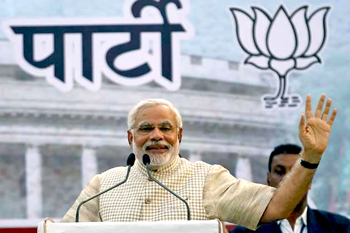Washington, May 17: U.S. President Barack Obama effectively reversed a nine-year U.S. visa ban when he congratulated Gujarat Chief Minister Narendra Modi on his party's “historic” victory in the Indian general election, and then invited Mr. Modi to visit the U.S. at a “mutually agreeable time to further strengthen our bilateral relationship.”
 Additionally, the White House said on Friday, “We look forward to working with [the new Indian government] once formed to advance our partnership.”
Additionally, the White House said on Friday, “We look forward to working with [the new Indian government] once formed to advance our partnership.”
U.S. Secretary of State John Kerry chose micro-blogging site Twitter to say to Mr. Modi, “Congrats to @narendramodi and BJP. Look forward to working w/you/growing shared prosperity/security w/world's largest democracy.”
The State Department elaborated on Mr. Kerry's statement saying that it congratulated Mr. Modi and the BJP on its victory in winning a majority of seats in India's historic national election, “which saw more voters cast their ballots freely and fairly than in any election in human history.”
State Department officials said that they understood that the next steps were for the Indian Election Commission to officially inform the President of the certified election results, and for him to appoint a Prime Minister.
The U.S. has, since 2005, denied Mr. Modi an entry visa on the grounds that he has been linked to curtailments of religious freedom in the context of the 2002 Gujarat riots.
However, on Friday, the White House Press Secretary Jay Carney said during a media briefing “The Prime Minister of India will be welcomed to the U.S.,” and added that once the government was formed, the U.S. looked forward to working “closely with the Prime Minister and the Cabinet to advance our strong, bilateral relationship based on shared democratic values.”
The State Department echoed the White House view that “The Prime Minister of India will be welcomed to the U.S. [and] as Head of Government, Mr. Modi would be eligible for an A-1 visa.”
Some groups in the U.S. drew attention to the visa and Gujarat riots issue on Friday, and the Coalition Against Genocide (CAG), an umbrella group focusing on justice and accountability for the pogrom said that it “pledged to continue its struggle with renewed fervour in the wake of the election results in India.”
CAG Spokesperson Raja Swamy underscored Mr. Modi's alleged links to the RSS cautioning that “During this election campaign, RSS leaders have been openly raking up contentious issues, posing a threat to communal harmony and increasing the prospect of violence against minorities.”
Reactions to the BJP's stronger-than-anticipated victory in the elections were nevertheless broadly positive.
New York Democratic Congressman and Co-Chair of the Congressional Caucus on India and Indian-Americans, said, in a statement “From Kerala to Jaipur, from Mumbai to Kolkata, the power of democracy was on display throughout the country. I applaud India's commitment to the democratic process and wish the Indian people and government the very best.”
Sanjay Puri, Chairman of the U.S. India Political Action Committee similarly said, “On behalf of the Indian-American community and friends of India in the U.S., USINPAC extends its warm congratulations to Narendra Modi for leading the BJP to a spectacular victory in these historic elections in India.”
Emphasising that Indian-Americans were “heartened to note that the BJP will have single party majority in the Parliament,” he added, “The Indian Diasporas and friends of India in the U.S. … cheer and send our best of wishes to the people of India, and the leadership of Mr. Modi.”
The Confederation of Indian Industry, which has spearheaded numerous efforts to boost India's profile as an investor in the U.S. economy and a destination for U.S. investments, welcomed the election results with an eye on the prospects for accelerating future economic growth.
Chandrajit Banerjee, CII Director-General, said, “With a decisive mandate, the new government could take the tough decisions that are urgently needed to revive economic growth. The first priority is to get the cleared projects operational. This is the quickest way to revive investment demand.”
He also urged the new government, once formed, to sharpen the focus on “issues arising out of the land acquisition act and the new companies act,” and passing a “strong reform package… to generate the 150 million new jobs that India needs over the next ten years.”






Comments
Add new comment